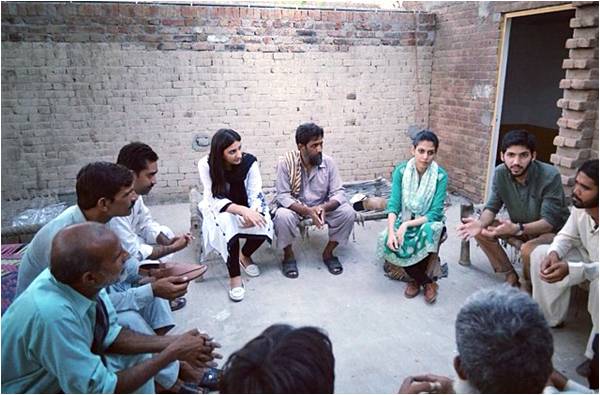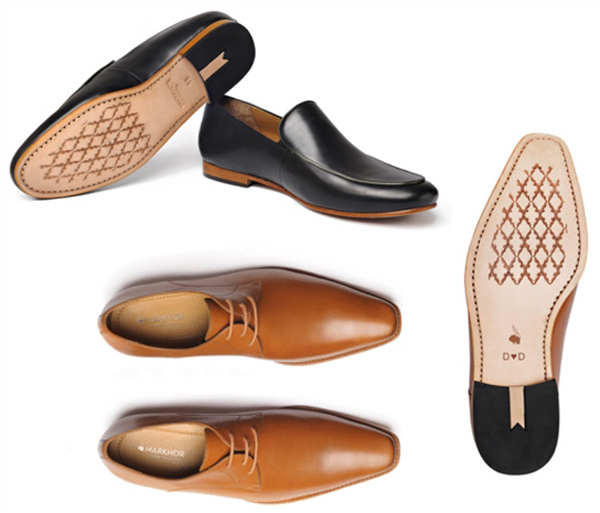
What do people look for when they buy shoes? Some try to strike a balance between utility and economy. Others will chase the high-priced luxury that certain brands offer. Neither group is likely to pay much attention to the process that went into making them. The concepts of “heritage” and “art” tend to mean little when it comes to something as simple as the shoes we wear.
That may be about to change thanks to a new behemoth called Markhor. This startup had a simple mission: to revive the ancient art of high-end handmade men’s shoes in their tiny hometown of Okara. Why let international designers like Paul Smith co-opt and repurpose one of the most intrinsic aspects of our culture?
In less than four years since, the Markhor team has earned support and funding from some of the finest tech incubators of the industry, including Google-supported Pashafund and the Acumen Fund. Most recently, they pulled off the most successful Kickstarter campaign Pakistan has ever seen, raising $107,286 in 45 days – over 7 times their initial modest goal.
Co-founders Sidra Qasim and Waqas Ali are still overwhelmed by this unprecedented success. “We had expected to meet our goal eventually with a couple of hundred backers,” said Qasim, 27. “But when we hit the $15,000 mark in less than 22 hours of launching our campaign, we were stunned.”
All this based on the simple promise of a remarkably high quality pair of shoes, and supporting the struggling artisans behind it. Their client base expanded to the Middle East, Europe and North America, and the endorsements started pouring in. Their success relies heavily on word-of-mouth and excellent customer service, rather than expensive marketing strategies.
“People don’t just want a product, no matter how great the quality is,” said Ali, 26. “They want to be part of a story. That is what our clients have invested in with us.”
And what a beautiful, compelling story it is. Markhor’s superior presentation and clean design have clearly contributed to the attention it has attracted. Noted entrepreneur and author Seth Godin featured Markhor’s campaign on his blog saying, “The world keeps getting smaller and ideas and connection are the currencies that matter, not atoms or molecules.”

Which is an apt understanding of what Markhor stands for. The team shows great passion in relating facts and figures, sharing plans for their next steps. But it’s hard to miss that they aren’t just another product-oriented group of sophisticated salespeople. They’re driven individuals supporting an indigenous art and a vital community in their hometown, both of which are increasingly marginalized by market demand for cheaper, more readily available goods. It’s a simple, but powerful, idea.
“We know these craftsmen. We know their problems. We see their struggles,” Ali explains. “This is just our small way of giving back, not only to these remarkable artisans, but to our culture.”
Qasim herself stands as a testament to how much an idea can achieve. Remarkable as she is – a female entrepreneur in a male-dominated circle – the odds were stacked against her right from the start. A small-town Punjabi girl who fought against cultural and social norms to make something of herself as a businesswoman in Lahore was not without its challenges. “It was hard for my parents to understand at first,” she remembers, with a wistful smile. “We went through some very difficult times. But they’ve come to appreciate what we’ve achieved over time. The struggle is never over, but it’s a start.”
The team is far from their initial stage of struggle now too. From their early days working out of a local KFC for lack of a better venue, they have now expanded to a global team, from stellar designers graduating from high-ranked fashion programs to a San Francisco-based operations manager.
The crowdfunding campaign was not without its hiccups either. Most Pakistani funders were deterred by the high price. “We’re importing cow leather for the soles since it isn’t available locally. We’re using materials so high in quality that they aren’t even available for the local market,” Qasim explains. “These aren’t just shoes – we’re marketing a lifestyle choice.”
Of course, there was also a lot of adjustment required in thinking for both the team and their clients. “We spent a long time reassuring people that these shoes weren’t actually made of Markhor hide,” Ali says with a laugh. “People just took the logo at face value and went on.” He even related the ideological battle he fought when one client in the US requested his pair be personalized with a plea to legalize marijuana. “In the end, I was convinced there was nothing wrong with it. The client always comes first.”
This attention to detail and top-notch customer service is evidenced by their limited range of products. “For us, it’s most important that we do the very best of what we can do. If that means sticking to a few things and attaining perfection, then that’s what we’ll do,” says Qasim. “We’re obviously looking to expand into other products, but our first priority is to deliver the huge influx of orders we’ve gotten over the last month.”
It’s clear with this focused attitude that the only way Markhor can go from here is up. The more important fact of the matter is that they’ve laid the stepping stones for a very promising new trend. Here’s to a beacon of hope in Pakistan’s fledgling startup ecosystem, and in the steady business of stellar shoes.
That may be about to change thanks to a new behemoth called Markhor. This startup had a simple mission: to revive the ancient art of high-end handmade men’s shoes in their tiny hometown of Okara. Why let international designers like Paul Smith co-opt and repurpose one of the most intrinsic aspects of our culture?
In less than four years since, the Markhor team has earned support and funding from some of the finest tech incubators of the industry, including Google-supported Pashafund and the Acumen Fund. Most recently, they pulled off the most successful Kickstarter campaign Pakistan has ever seen, raising $107,286 in 45 days – over 7 times their initial modest goal.
People don't just want to buy a product, they want to be part of a story
Co-founders Sidra Qasim and Waqas Ali are still overwhelmed by this unprecedented success. “We had expected to meet our goal eventually with a couple of hundred backers,” said Qasim, 27. “But when we hit the $15,000 mark in less than 22 hours of launching our campaign, we were stunned.”
All this based on the simple promise of a remarkably high quality pair of shoes, and supporting the struggling artisans behind it. Their client base expanded to the Middle East, Europe and North America, and the endorsements started pouring in. Their success relies heavily on word-of-mouth and excellent customer service, rather than expensive marketing strategies.
“People don’t just want a product, no matter how great the quality is,” said Ali, 26. “They want to be part of a story. That is what our clients have invested in with us.”
And what a beautiful, compelling story it is. Markhor’s superior presentation and clean design have clearly contributed to the attention it has attracted. Noted entrepreneur and author Seth Godin featured Markhor’s campaign on his blog saying, “The world keeps getting smaller and ideas and connection are the currencies that matter, not atoms or molecules.”

Which is an apt understanding of what Markhor stands for. The team shows great passion in relating facts and figures, sharing plans for their next steps. But it’s hard to miss that they aren’t just another product-oriented group of sophisticated salespeople. They’re driven individuals supporting an indigenous art and a vital community in their hometown, both of which are increasingly marginalized by market demand for cheaper, more readily available goods. It’s a simple, but powerful, idea.
“We know these craftsmen. We know their problems. We see their struggles,” Ali explains. “This is just our small way of giving back, not only to these remarkable artisans, but to our culture.”
Qasim herself stands as a testament to how much an idea can achieve. Remarkable as she is – a female entrepreneur in a male-dominated circle – the odds were stacked against her right from the start. A small-town Punjabi girl who fought against cultural and social norms to make something of herself as a businesswoman in Lahore was not without its challenges. “It was hard for my parents to understand at first,” she remembers, with a wistful smile. “We went through some very difficult times. But they’ve come to appreciate what we’ve achieved over time. The struggle is never over, but it’s a start.”
The team is far from their initial stage of struggle now too. From their early days working out of a local KFC for lack of a better venue, they have now expanded to a global team, from stellar designers graduating from high-ranked fashion programs to a San Francisco-based operations manager.
The crowdfunding campaign was not without its hiccups either. Most Pakistani funders were deterred by the high price. “We’re importing cow leather for the soles since it isn’t available locally. We’re using materials so high in quality that they aren’t even available for the local market,” Qasim explains. “These aren’t just shoes – we’re marketing a lifestyle choice.”
Of course, there was also a lot of adjustment required in thinking for both the team and their clients. “We spent a long time reassuring people that these shoes weren’t actually made of Markhor hide,” Ali says with a laugh. “People just took the logo at face value and went on.” He even related the ideological battle he fought when one client in the US requested his pair be personalized with a plea to legalize marijuana. “In the end, I was convinced there was nothing wrong with it. The client always comes first.”
This attention to detail and top-notch customer service is evidenced by their limited range of products. “For us, it’s most important that we do the very best of what we can do. If that means sticking to a few things and attaining perfection, then that’s what we’ll do,” says Qasim. “We’re obviously looking to expand into other products, but our first priority is to deliver the huge influx of orders we’ve gotten over the last month.”
It’s clear with this focused attitude that the only way Markhor can go from here is up. The more important fact of the matter is that they’ve laid the stepping stones for a very promising new trend. Here’s to a beacon of hope in Pakistan’s fledgling startup ecosystem, and in the steady business of stellar shoes.

